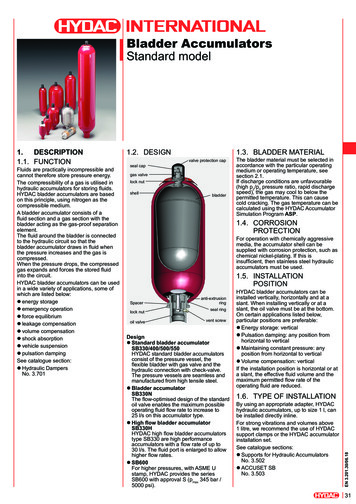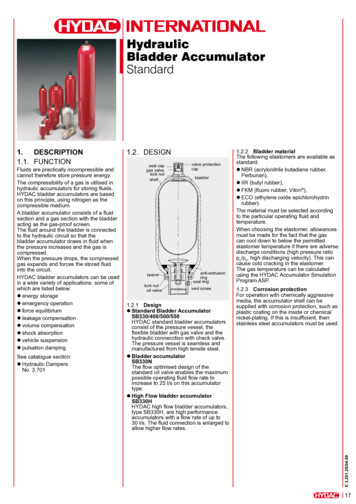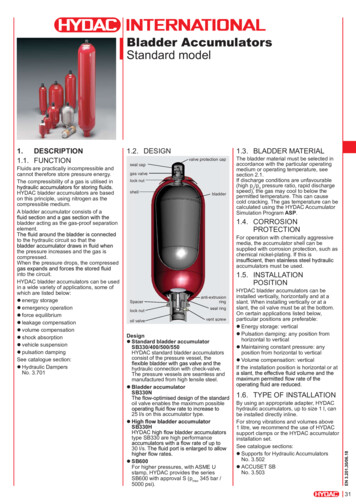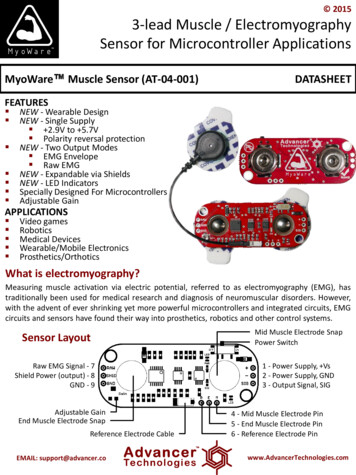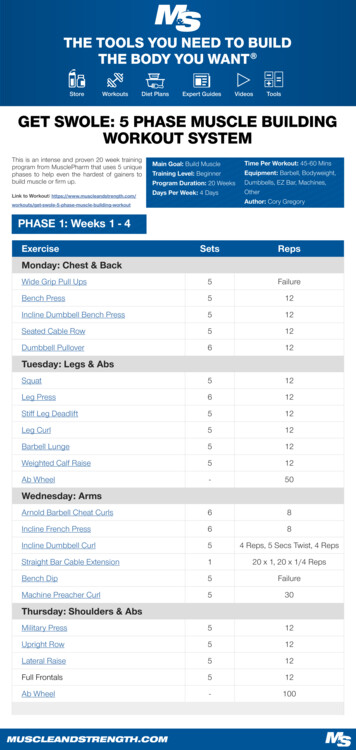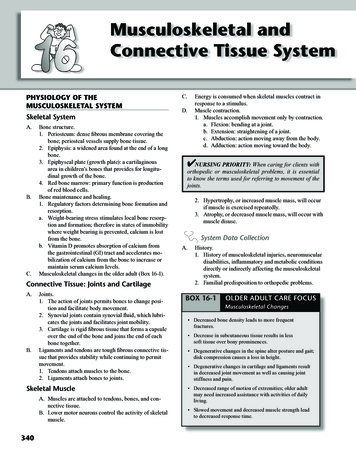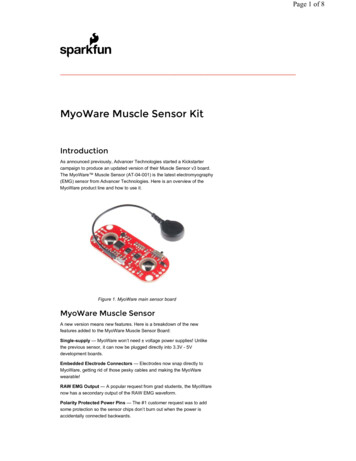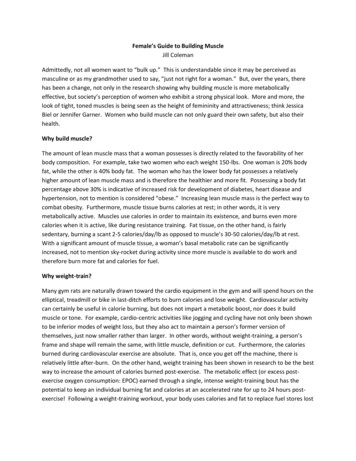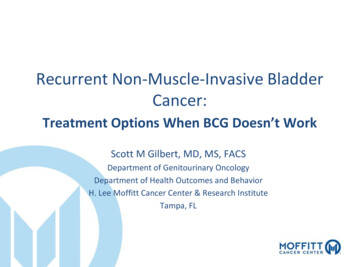
Transcription
Recurrent Non-Muscle-Invasive BladderCancer:Treatment Options When BCG Doesn’t WorkScott M Gilbert, MD, MS, FACSDepartment of Genitourinary OncologyDepartment of Health Outcomes and BehaviorH. Lee Moffitt Cancer Center & Research InstituteTampa, FL
No Relavent Disclosures DisclosuresNCI R01 CA164128 (PI McMullen)Florida Bankhead Coley Research Program 3BN03 (PI Gilbert)
NMIBC Risk GroupsLow-RiskPrimary solitary, Ta, low grade, 3 cm, no concurrentcarcinoma in situ (CIS) detectedSmall volume ( 3 cm) low-grade TaIntermediate-RiskPrimary, solitary low-grade tumors 3 cmMultiple primary low-grade Ta tumorsSolitary recurrent low-grade Ta tumorMultifocal and/or large volume low-grade TaLow-grade Ta tumor recurrent within 1 yearHigh-grade Ta, 3 cmLow-grade T1High-RiskHigh-grade tumors, any lamina propria invasion (T1),carcinoma in situMultiple, recurrent low-grade Ta tumors 3 cmHigh-grade Ta 3cm or any recurrent high-grade TaAny CIS; High-grade T1Any variant histology, any LVI, any BCG failure, any PUBabjuk et al. Eur Urol 2016, in press, http://dxdoi.org/10.1016/j.eururo.2016.05.041Chang et al. AUA guidelines for NMIBC, www.auanet.org/guidelines
Immune Response to BCGMechanismAttenuated mycobacterium bindsto fibronectinDirect stimulation of cellmediated immune responseCytokine (TNF-α, INF-γ, IL-2, IL-12,IL-18) induction of intense Th-1responseRedelman-Sidi et al. Nat Rev Urol 2014;11:154-62
Response/Effectiveness of Initial BCG CourseInitial response rates of approximately 70% Recurrence observed in approximately 40% of patients after 4-5 years Large meta-analysis reported 68.1% complete response rate and along-term disease-free rate of 46.7% at 3.6 years among patientswith CISLatent effect of 3-6 months reported on follow-up biopsiesBCG therapy may reduce risk of tumor progression EORTC-GUCG meta-analysis including 4,863 patients reported 9.8%progression in BCG treated patients compared to 13.8% in controlgroups (median follow-up 2.5 years) Up to 30% of BGC non-responders may progress by 5 yearsSmyth et al. J Urol. 1992 Jun;147(6):1636-42Sylvester et al. J Urol 2005;174:86-92Kakiashvili et al. Eur Urol Suppl 2009;8:A645Sylvester et al. J Urol 2002;168:1964-70
Results with Second BCG InductionStudyDiseaseNRecurrence2-Yearrecurrence 21635%Overall
WSJ, May 31, 2015
BCG Strains May Not Be EqualRecurrence-Free Survival b/w Connaught and TICE BCGBCG Strain5-yearsurvivalestimate95% CIp value0.011Recurrence-free gression-free survivalConnaught94.187.8-1000.344n 142,Tice no maintenance87.9 therapy 76.5-100*no significant difference in disease-specific/overall survivalEORTC meta-analysis did not show significant differences in efficacy between different BCG strains, but a few individual studiRentsch et al. Eur Urol 2014;66:677-88Sylvester et al. J Urol 2002;168:1964-70
Reasons for BCG FailureInadequate/insufficient immune response- Immune suppression (age 80 yrs, immunosuppressive medications)- BCG anergy- Incomplete dose/suboptimal administration- Polarized Th2/Th1 response (reported with higher BCG doses)- Tumor induced immune suppression (e.g. PD1/PDL1 axis)Intrinsic tumor resistance to immune surveillance- Cell death receptor/signal loss- Failed immune recognition- Immune response modification (e.g. NRAMP1 gene polymorphisms)
BCG Failure DefinitionsBCG failure: Presence of high-grade NMIBC at 6 months from initialdiagnosis/treatment, or progression or worsening disease at 3 monthsBCG-refractory: failure to achieve disease-free state at 6 months followinginitial BCG therapy with either maintenance or re-treatmentBCG resistance: recurrence or disease persistence at 3 months followingBCG inductionBCG relapse: disease recurrence after disease-free interval achieved at 6months following initial successful BCG inductionBCG intolerance: disease recurrence/persistence secondary to inability ofpatient to receive/tolerate adequate BCG treatment courseHerr et al. J Urol. 2003;169:1706-8Nieder et al. Urology 2006;67:737-41
Clarified Definition of Unresponsive DiseaseRefractory: Persistent high-grade disease at 6 months despite adequateBCG treatment, or any stage or grade progression by 3 months after the firstcycle of BCGRecurrent: Recurrence of high-grade disease after achieving a disease-freestate at 6 months after adequate BCGIntolerant: Disease persistence as a result of inability to receive adequateBCG secondary to treatment toxicityUnresponsive: BCG refractory or relapsing disease within 6 months of lastBCG exposure (subgroup of highest risk recurrence/progression) AdditionalBCG not indicatedLerner et al. Bl Cancer 2015;1:29-30Kamat et al. J Clin Oncol 2016;34:
Validation of BCG Unresponsive DefinitionPatients with Any CISPrior BCG Interval/Number of BCG Course 12m 1 BCG 12m 1 BCG 12m 2 BCG 12m 2 BCGSteinberg RL et al. Bl Cancer 2016;2:215-24
Second-Line/Salvage/Rescue Therapy OptionsConventional chemotherapy (e.g. mitomycin, valrubicin)Single agent immunotherapy (BCG or INF)Combination immunotherapy (BCG INF/IL2/GMCSF)Alternative single agent chemotherapy (e.g. gemcitabine, docetaxel)Combination chemotherapy (e.g. gemcitabine mitomycin)Novel/investigational agents
Outcomes with Conventional AgentsStudy (year)AgentHistologyN2/3 year DFSCatalona (1987)3rd cycle BCGMixed1120%Williams (1996)InterferonCIS3412%Malstrom (1999)MitomycinMixed2119%Steinberg (2000)ValrubicinCIS908%Catalona et al. J Urol 1987;137:220Williams et al. J Urol, suppl 1997;155:494AMalmstrom et al. J Urol 1999;161:1124
Yates et al. Eur Urol 2012;62:1088-1096
2Yates et al. Eur Urol 2012;62:1088-1096
Final Results of BCG INF Phase II TrialPhase II (single-arm) study of BCG INF1106 BCG naive and failure patients (467 BCGx1or more failures) recruited b/w 1999-2001Induction with 1/3 BCG dose 50 million units ofinterferon- 2B with maintenance (re-inductionin 50% of cases)13% BCG refractory, 34% failed within 6m, 28%failed b/w 6-12m, 15% within 12-24m, and 10%after 24mT1 stage (HR 1.42), tumor size 5cm (HR 1.59),prior BCG 2 courses (1.56) and multifocality(HR 1.34) significantly associated withrecurrence*sponsored by Schering-Plough, Inc.Joudi et al. Urol Oncol 2006;24:344348
ValrubicinStudy A9303 (open-label phase II/III, single arm)Enrolled 80 patients with CIS alone or in combination w/ Ta/T1 treatedwith 6-9 week induction of IV valrubicin (800mg)39% of patients had received 2 BCG courses24/80 patients disease free at 3 months and 14/80 defined as completeresponse (disease free at 3 and 6 months)Disease-free status probability 22% at 6 months, 10% at 12 months and4% at 24 monthsDinney et al. Urol Oncol 2013;31:1635-1642
ValrubicinOpen label noncomparative study90 patients with recurrent CIS /- completely resected papillary tumorpreviously treated with at least 2 IV agents (one of which was BCG)6 week induction of IV valrubicin19/90 (21%) patients deemed complete responders (no disease at 3 or6 month evaluation)Treatment failed in 10 non-responders with low-grade papillary tumorsonly (therefore potential benefit in (32% of study subjects)Steinberg et al. J Urol 2000;163:761-767
Intravesical GemcitabinePhase III RCT Gemcitabine vs. MitomycinPhase II RCT Gemcitabine vs. BCG6 pts. recurred w/progression1 pt died of metastatic disease21/40 (52.5%) recurrent disease7/21 (33%) w/ progression to cx10 pts. recurred w/progression1 pt died of metastatic disease120 patients w/ recurrent NMIBC after BCG failure(85%) or BCG ineligible treated w/ epirubicin (15%)Addeo et al. J Clin Oncol 2010;28:543-548Di Lorenzo et al. Cancer 2010;116:1893-190035/40 (87.5%) recurrent disease13/35 (37.5%) w/progression to cx80 patients w/ recurrent NMIBC after 1 BCG course(*gemcitabine given twice weekly x6 weeks, 1/3patients w/ low-grade disease)
Intravesical GemcitabinePhase II (single-arm) S0353Recurrence-Free survival58 intermediate or high risk who failed 2 priorBCG instillations recruited b/w 2007-2009Induction with 2 gm gemcitabine in 100 mLsaline for 1 hour x 6 weeks with 10 monthlymaintenance if recurrence free96% pts. completed all treatments3-month complete response in 40%Median RFS 6.1 months24-month estimated DFS 21%Disease progression/cystectomy in 36%62% grade 1-2 toxicity (dysuria/frequency)2 pts. w/ grade 3 toxicity(dysuria/frequency/neutropenia)Overall survivalSkinner et al. J Urol 2013;190:1200-1204
Single Agent DocetaxelLong-term follow-up results from Phase IDose escalation phase I trial with initial (4-weekpost IV tx) complete response in 10/18 (56%)patientsDurable complete response in 4/18 (22%) atmedian follow-up of 48 monthsExtension study with maintenance54 patients (including 18 phase I subjects) withaddition of monthly maintenance for 12 months(75mg/100mL)1- and 3-year recurrence-free survival 40% and25%, respectively69% of patients retained their bladder at amedian 24 monthsLaudano et al. Urology 2010;75:134-137Barlow et al. J Urol 2013;189:834-839Disease-free survival at 1 and 2 years(*no further intravesical therapy/cystectomy)
Sequential Gemcitabine/Mitomycin3-site non-comparative study using gemcitabine 1 gram/50 mL mitomycin 40mg x 6 weeks with monthly maintenance x 12 months47 BCG failure/intolerant patients treated b/w 2000 and 2010 (*10 patientsBCG naive but immunosuppressed)14/47 (30%) of patients remained recurrence free at median of 26 monthsComplete response, 1-year RFS and 2-yearRFS 68%, 48% and 38%, respectivelyNo difference b/w BCG naive and failuregroups10 patients treated with cystectomy forrecurrence, 2 patients died of metastaticdiseaseLightfoot et al. Urol Oncol 2014;32:35.e15-35.e19
Sequential tabine 1 gram in 50 mL sterile water instilled for 90 minutesMitomycin 40 mg in 20 mL in sterile water instilled for 90 minutesGemcitabine administered first (thought to be better tolerated and could bemade less effective by DNA cross-linking action of mitomycin)Patients evaluated with cystoscopy, bladder washings, bladderbiopsies/resection 6 weeks following completion of the intravesical therapycourse and then with 3 month cystoscopiesTolerance10 patients reported frequency, urgency and/or dysuria (grade 1-2)3 patients reported significant rash1 patient developed pericarditis attributed to MMC exposureLightfoot et al. Urol Oncol 2014;32:35.e15-35.e19
Sequential Gemcitabine/DocetaxelUniversity of Iowa Pilot Study45 patients treated with sequential combinationgemcitabine/docetaxel b/w 2009-2014 for intravesical salvage(compassionate indication)Docetaxel replaced mitomycin in 2009 due to mitomycin shortage41/45 (91%) patients previously treated with BCG (37 recurrent, 4intolerant)Gemcitabine instilled first b/c requires DNA synthesis to be effectiveand docetaxel inhibits mitosis by blocking tubulin disassemblyAlkalinization with 1300 mg sodium bicarbonate evening prior andmorning of instillation to buffer acidity of gemcitabine (pH 2.5)Steinberg et al. Bl Cancer 2015;1:65-72
Gemcitabine/Docetaxal Instillation ProtocolAlkalinization with 1300 mg sodium bicarbonate evening prior andmorning of instillation to buffer acidity of gemcitabine (pH 2.5)1 gram gemcitabine in 50 mL sterile water instilled for 90 minutes,followed by 37.5 mg docetaxel dissolved in 50 mL in saline for 120minutes6-week induction course with re-revaluation (cystoscopy vs. biopsy) 6-8weeks after intravesical treatments are completedMonthly maintenance administered for 24 months if recurrence freeSteinberg et al. Bl Cancer 2015;1:65-72
Initial Results with Intravesical Gem/DoceTolerance5 (11%) patients unable to tolerate full 6 treatment course28 (62%) patients reported symptoms, 7 (16%) delayed treatment scheduleMost common symptoms were: mild dysuria (33%), mild urinaryfrequency/urgency (33%), hematuria (11%), nausea (7%)Effectiveness66% response rate at 3 monthsurveillance, 54% at 1 year, and 34% at2 yearsMedian time to failure 3.1 months, 67%of failures occurred within first 6monthsStage, /- CIS, number or type of BCGfailure not associated w/ successSteinberg et al. Bl Cancer 2015;1:65-72Recurrence-free survival
Natural History of Unresponsive NMIBC(Safety Margin)Median time to progression in 14 T1G3 BCG series is 24 months (rare progression at6 months)Untreated CIS has annual progression rate of 5%, likely higher given that 30-40% ofinitial responders failReported progression 3.3% at 6 months and 8% at 1 year, with mortality 0.4% at 6months and 1% at 1 yearTiming of cystectomy:90 patients at MSK, 35 recurrences, 55 progressionsSurgery 2 years: 92% DFS, 18% progressionSurgery 2 years: 56% DFS, 41% progression (Herr, J Urol 2001)Although substantial risk under staging with early cystectomy (27-50%), mostrecent BCG failure series report a high rate of pT0/ pT2Valrubicin study: cx in 44/79 pts. at median of 24m, 80% T0-T2, 2 pts. w/ LNGem/Mito study: cx in 10/52 pts., 2 pts. died of metastatic diseaseGem/Doce study: cx 10/45 pts. at median of 5.6m, 3 T0, 5 CIS, 1 T1, 1 T4S0335: cx in 15/58 pts. 12 T2, 3 w/ T2 Millian-Rodriguez et al J Urol 2000Herr et al, J Urol 2001
Investigational Agent PipelineDrugTrial 7Swiss Group for Clinical Cancer ResearchIRecruitingPembrolizumabNCT02625961Merck Sharp & Dohme ezolizumab /- rmia MCC vs. 2nd BCGNCT01094964Cancer Research Campaign Clinical TrialsCenterIIIRecruitingInstiladrin (rAd-INF/Syn3)NCT02773849FKD TherapiesIIIRecruitingCG0070 Oncolytic VirusNCT02365818Cold Genesys, IncIIIRecruiting12-week course of 2nd BCGNCT02281383Memorial Sloan KetteringIIRecruitingVivinium (VB4-845)NCT02449239Viventia BioIIIRecruitingCabazitaxel, Gemcitabine, Aadi, LLCI/IIRecruitingDurvalumab (MEDI4736)www.clinicaltrials.govII
2016 AUA Guideline RecommendationsChang et al. 2016 AUA Guidelines for NMIBC
SummaryCareful patient selection, discussion of risks and unwillingness to accept orundergo cystectomyComplete restaging evaluation (including upper tract) necessaryBCG combination immunotherapy reasonable for late relapse ( 12m) inpreviously BCG treated patientsSingle agent gemcitabine and docetaxel reasonable for moderate risk BCGfailures, but may not have durable effectHigh-risk cases, non-surgical candidates and patient refusing cystectomymay best be treated with combination/sequential second-line agentintravesical therapy, but we really need better studiesClinic trial best options if available at your practiceMaintain awareness of 1-2 year timeframe of BCG failure where diseasetypically stays localized within the bladder
Recurrence-Free Survival b/w Connaught and TICE BCG BCG Strain 5-year survival estimate 95% CI p value Recurrence-free survival Connaught 74.0 62.8-87.2 0.011 Tice 48.0 35.5-65.1 Progression-
